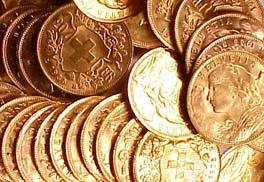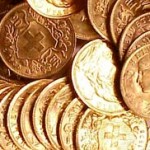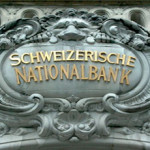What the Swiss franc shock means for markets

Dennis Gartman told CNBC the Swiss decision Thursday to abandon a key part of its monetary policy is the worst central bank move he’s ever seen.
“This really is I think a silly decision on their part and it has inflicted enormous losses across the world to a great number of people,” the editor of the Gartman Letter said in a “Squawk Box” interview.
The Swiss franc rose nearly 30 percent against the euro after the Swiss National Bank‘s announcement that it would remove a 3-year-old cap of 1.20 francs per euro.
“They gave you no indication that this was going to happen. They had been spending enormous amounts of money, enormous amount of Swiss francs, which they could create as a central bank out of the thinnest of air,” Gartman said. “They promised that they would be doing that on a consistent basis. Intervention to defend your currency is very difficult, but intervention to send your currency lower or keep it lower is easily accomplished.”
By abandoning its policy, the Swiss central bank stands to lose tens of billions of dollars, he added. Further, the impact on the Swiss stock market and the losses that are accruing to Swiss citizens are going to be hard for the bank to defend.
The move was part of a strategy to fight deflation, said Marc Chandler, global head of markets strategy at Brown Brothers Harriman.
Before 2011, when the central bank implemented the cap, it tried buying foreign bonds as a type of quantitative easing, Chandler told “Squawk Box.” That failed to fight to deflation, so the Swiss enforced the currency cap, he said.
“Now they’re giving up on it. The force at work here is not about the euro zone, though I agree that anticipation of sovereign bond buying in the euro zone in the next two meetings helped compel the central bank to abandon it’s previous strategy,” he said. “The key here is that oil prices, commodity prices have collapsed. Many countries are fighting with deflation.”
Asked what financial sector dislocations will follow, Chandler said he felt bad for retail investors in foreign exchange, calling that market a highly leveraged “dangerous game.” He expects the U.S. bond market to rally, with yields continuing to fall, and said retail and institutional investors have little choice but move into equities.
“The currency is a very small part of global reserves. This is important for speculators. It’s important for some investors, but at the end of the day, I think, the point really is it’s indicative of the pressure of other countries, as well, with falling oil prices, experiencing deflation or disinflation, and what it really turns into is very low nominal growth and this is a challenge not only for the Swiss National Bank, but for all central banks,” he said.
Billionaire value investor Mario Gabelli told CNBC: “In that currency change, there are a lot of dynamics, and the Swiss will do what the Swiss will do. Too bad. If somebody is caught naked, it is what it is and you’re going to lose a lot of money.”
The Gamco Investors boss added that surprise moves like the one from the Swiss are a “good way to keep people kind of focused on what they should be doing” with their money, instead of just putting their portfolios on autopilot.
The development on Thursday marked the Swiss central bank’s admission that its policy had failed, Boris Schlossberg, managing director at BK Asset Management, told “Squawk Box.”
“This is the single-biggest surprise. Everybody thought it was going to be the market that would drive the euro-Swiss down,” he said, adding, “I think what they realized was basically it was impossible to hold the peg after [the European Central Bank] was going to do QE.”
The euro zone has now entered a more dangerous phase of its crisis, Scott Brown, chief economist at Raymond James, told “Squawk on the Street.” Fiscal policy would likely be very effective, but it is dead politically, leaving quantitative easing as the ECB’s only weapon, Brown said.
“A couple years ago it was just about the survivability of the monetary union, and now it’s really about a battle against the possibility of deflation or at least an extended period of stagnation,” he said.
The situation in Switzerland is the opposite of a currency war, he said, noting the policy was meant to keep the franc from appreciating. While much of the flight to safety flowed in Germany amid concerns over the euro area two years ago, but now that capital is moving into Switzerland and the United States, he said.
With the Swiss central bank out of the market for euros, the dollar could reach parity with the euro as it continues to slide, Kathy Lien, forex strategist with BK Asset Management said. Now that the euro has touched the 1.15 handle, there is a very good possibility it could dip as low as 1.10 in the near term, she added.
The Swiss National Bank’s decision essentially telegraphs that the ECB will take action next week, Lien said, noting that the bank likely conferred with ECB President Mario Draghi before dropping the cap.
While the euro weakness takes some pressure off the ECB, Lien still believes quantitative easing is coming—the question is the size.
“I think 500, 600 billion really seems to be the likely starting point, and so that message is what the market is focusing on,” she said.
If the ECB disappoints at next week’s meeting the euro will likely rally to a minimum of 1.17, and could rise even before that as investors take profit next week, Lien said. For investors who think the ECB will disappoint, that presents an opportunity to sell euros at a higher level because all of the pressures in the euro zone are not going away, she said.
Source: CNBC – What the Swiss franc shock means for markets




























